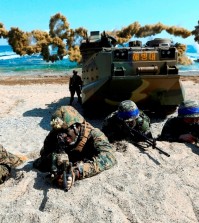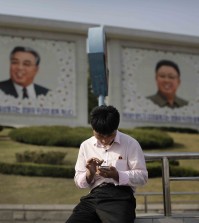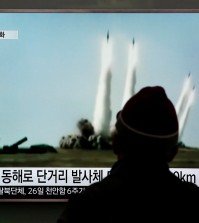- California Assembly OKs highest minimum wage in nation
- S. Korea unveils first graphic cigarette warnings
- US joins with South Korea, Japan in bid to deter North Korea
- LPGA golfer Chun In-gee finally back in action
- S. Korea won’t be top seed in final World Cup qualification round
- US men’s soccer misses 2nd straight Olympics
- US back on track in qualifying with 4-0 win over Guatemala
- High-intensity workout injuries spawn cottage industry
- CDC expands range of Zika mosquitoes into parts of Northeast
- Who knew? ‘The Walking Dead’ is helping families connect
British expert: ‘N. Korea could have oil, gas’
By Choi Sung-jin
In November 1998, Chung Ju-yung, the late founder of the Hyundai Group, returned from North Korea and surprised people, saying, “Pyongyang sits on a vast reserve of crude oil.” The South Korean tycoon’s excitement soon proved to be too hasty.
A year earlier, the North Korean government said it had discovered an oil field that could produce 450 barrels a day, a fraction of the 20,000 barrels which is the minimal level to be commercially viable. After the announcement, a host of foreign explorers from Sweden, Australia and Britain went to the North and came back, suspecting Pyongyang was exaggerating its potential to lure foreign capital.
However, some scientists and businesspeople who have worked with North Korea have mentioned the possibilities of huge oil reserves of scores of billions of barrels buried under the isolationist country. One such expert is Mike Rego, a British geologist and a veteran crude oil explorer, according to Kyunghyang Shinmun daily.
“It is rather surprising that commercial production of oil and gas is not being made in North Korea,” Rego wrote in the September issue of GEO ExPro, an industry magazine.
Rego had been in charge of oil exploration in Aminex, a British firm, which signed a 20-year contract with North Korea to explore and develop crude oil in 2004. Aminex left North Korea in 2012, but Rego remained there until the expiration of its contract term. The wildcatting expert put forth several pieces of evidence, including photographs, to back up his view.
Above all, Rego said Pyongyang gave the British oil prospector the right to explore its entire territory while it allowed Australian and Singaporean firms to explore only specific regions. “We could restore all analog data collected between the 1960s and the 2000s, and from that, concluded there are seven areas in the North that might have oil and gas reserves based on their seismic tests,” he said.
A Korean expert agreed. “These photographs can be used as the basis of enhancing the credibility of arguments about North Korea’s potential to be an oil producer,” Prof. Lee Chul-woo of Chungbuk University said.
It was the first time that North Korea made public its data related with oil exploration, which it had kept secret to even investors. “Judging from the data North Korea has made public recently, the country seems to be stepping up efforts to find promising oil fields,” Lee said. “It is proceeding toward rigging step by step.”












![일본 사도광산 [서경덕 교수 제공. 재판매 및 DB 금지]](http://www.koreatimesus.com/wp-content/uploads/2024/07/PYH2024072610800050400_P4-copy-120x134.jpg)



Pingback: Korea Gas | service station
Pingback: British Petroleum Exploration | fuelprices
Pingback: Oil & Gas Publications Australia | fuelcalculator